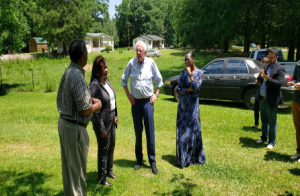Catherine Coleman Flowers, Advocacy Partner of the Human Rights Institute and Institute for the Study of Human Rights, Awarded 2020 Macarthur Fellowship

October 6, 2020, New York - Columbia University’s Institute for the Study of Human Rights (ISHR) and the Law School Human Rights Institute (HRI) are thrilled to congratulate long-standing collaborator, Catherine Coleman Flowers, for receiving the Macarthur Fellowship. ISHR and HRI have worked with Coleman Flowers to draw attention to the sanitation crisis facing Lowndes, County Alabama, and communities across the US. This human rights crisis, a result of disinvestment, neglect, and systemic discrimination is detailed in the joint 2019 report Flushed and Forgotten: Sanitation and Wastewater in Rural Communities in the United States.
Professor Winkler congratulated Catherine Flowers: “Catherine has been working on sanitation challenges in rural communities with admirable perseverance, even when no one was ready to listen. The fellowship elevates her advocacy to a new level and will allow her to reach new and broader audiences to rethink wastewater challenges in the context of human rights and environmental justice. I'm looking forward to our continued collaboration.”

Professor Inga Winkler and HRI's JoAnn Kamuf Ward have developed scholarship in partnership with Catherine Flowers bringing a human rights lens to the sanitation crisis, and connecting this work to ongoing struggles for racial justice and basic rights in the United States. This scholarship complements ongoing advocacy to improve domestic legal protections and policies both nationally, targeting Congress and the US State Department, as well as advocacy at the international levels.
Human Rights in the US Project Director, JoAnn Kamuf Ward celebrated the announcement: “Catherine has spearheaded advocacy to advance the right to sanitation and address the impact of systemic discrimination, advance climate justice, centering dignity and prioritizing meaningful participation of impacted individuals from Lowndes County, Alabama and similarly situated communities across the country. This fellowship offers well-deserved recognition of Catherine's innovation and dedication and will further elevate the recognition of the sanitation crisis and sustainable solutions.” Kamuf Ward continued: “This brings renewed energy and excitement to our ongoing efforts to leverage human rights principles to address the impacts of disinvestment and neglect.”
Read a statement by JoAnn Kamuf Ward, Director of the Human Rights in the U.S. Project at the Human Rights Institute, here.
